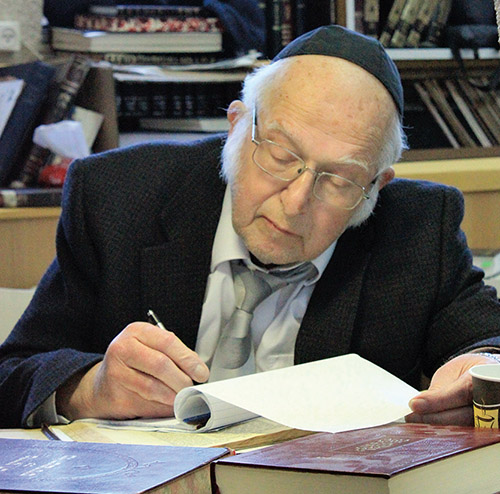

Rabbi, Cong. Ahavas Israel, Passaic-Clifton;�
Adjunct professor in Judaic Studies at Lander College for Women in Manhattan
The Gemara relates, “Rabbi Akiva had twelve thousand pairs of students … and they all died in one period of time, because they did not treat each other with respect… all of them died in the period from Passover until Shavuot,” (B.T. Yevamot 62b). The horrific tragedy of the twenty-four thousand students of Rebbe Akiva perishing in such a small window of time still haunts us today.
This is the primary source for the observance of mourning during this time period. The Gemara comments: “And the world was desolate of Torah,” (Ibid.) Rebbe Akiva not only saw his life’s work dissolve before his very eyes, he witnessed the entire world of Torah destroyed.
What was his own personal reaction to this tragedy?
The Gemara answers, “And the world was desolate of Torah until Rabbi Akiva came to our Rabbis in the South and taught his Torah to them. The talmidim are Rabbi Meir, Rabbi Yehuda, Rabbi Yosei, Rabbi Shimon and Rabbi Elazar ben Shamua. And these are the very ones who upheld the study of Torah.” These five great students are the ones who established Torah in the Eretz Yisrael and ultimately in the entire world. Too often we imagine the greats of our people as devoid of normal human emotions. We tend to think of them as dispassionate paragons of piety who are detached from feelings of despair. We create a picture of a stoic and enduring giant of a man who is not affected by the tragedy which befell him. Obviously this is not the case as Rebbe Akiva felt the pain more acutely than others.
Perhaps the greatest lesson which we can extrapolate from this incident is the lesson of endurance and perseverance. How else can we explain the courage of Rebbe Akiva who after witnessing the death of his beloved students, nevertheless, had the wherewithal to gather a new cadre of students and begin anew with the same vigor and passion?
The Omer is also a time where I recall a personal loss. The Yahrtzeit of my Rebbe, HaRav Aharon Lichtenstein, zt”l, is during the Omer on Rosh Chodesh Iyar. From an intellectual point of view I know that the story of Rebbe Akiva and his ability to remain steadfast and persistent in his mission despite the huge personal setback is a remarkable and unequaled achievement.
However, personally, I was privileged to observe from my rebbe a living example of persistence and of enduring dedication to Torah.
It was a few days before Pesach in 1980. Most yeshivos had given off already from Rosh Chodesh Nissan. At Gush, Rav Aharon persisted in teaching Torah for another week only ending the Zman a week before Pesach. As an American not going back to the States, I was privileged to be present and learn as the extended semester progressed. Needless to say, as the Zman grew longer attendance declined. By the last two days, there were only a handful of diehards who continued coming to the shiur.
On the last day of the zman I caught a ride with Rav Aharon back to Yerushalayim. Back then it was common for Rav Aharon to take boys to Yerushalayim. I asked him, “I did not notice any difference in the passion the rebbe displayed in the shiurim these last few days than with any other day of the zman. How does the rebbe maintain such an immutable regimen when each day more and more boys are absent?”
Without hesitation he said to me, “I learned that from my rebbe, Rav Ahron Soloveichik, zt”l. When I was learning in Chaim Berlin, he was my rebbe. He lived in Washington Heights as he taught concurrently at Yeshiva University. In the summer, most of the yeshiva went to Camp Morris. However, a small group of us remained in Brooklyn and kept learning in the yeshiva. By July, the shiur had dwindled to a handful of boys. Nevertheless, Rav Ahron would commute every day for two hours on the hot subway to give shiur. He never missed a day and we never noticed even the slightest difference in his intensity. It was from him I learned the lesson, that even if one person wants to learn, the Rebbe must come and teach.”
We all have reasons to slack off and even give up sometimes. However, when we recall the courage of Rebbe Akiva and when I personally remember the passion of Rav Aharon and his Rebbe, the ability to go on and never give up becomes that much easier.
By Rav Ron Yitzchok Eisenman
�









